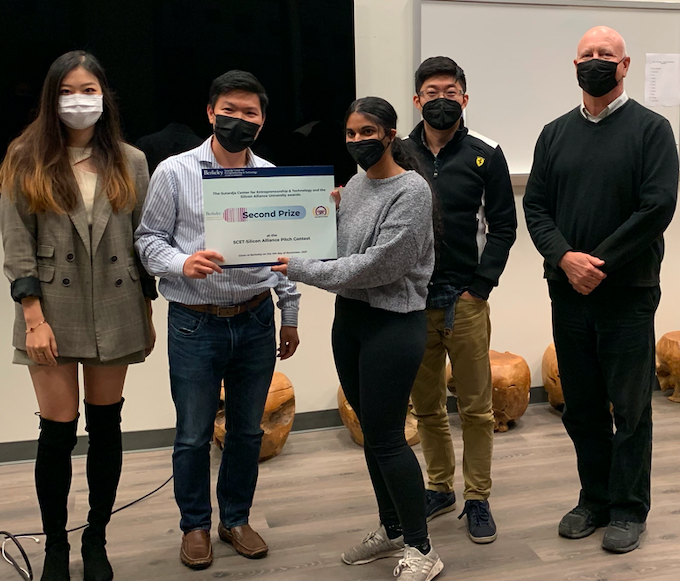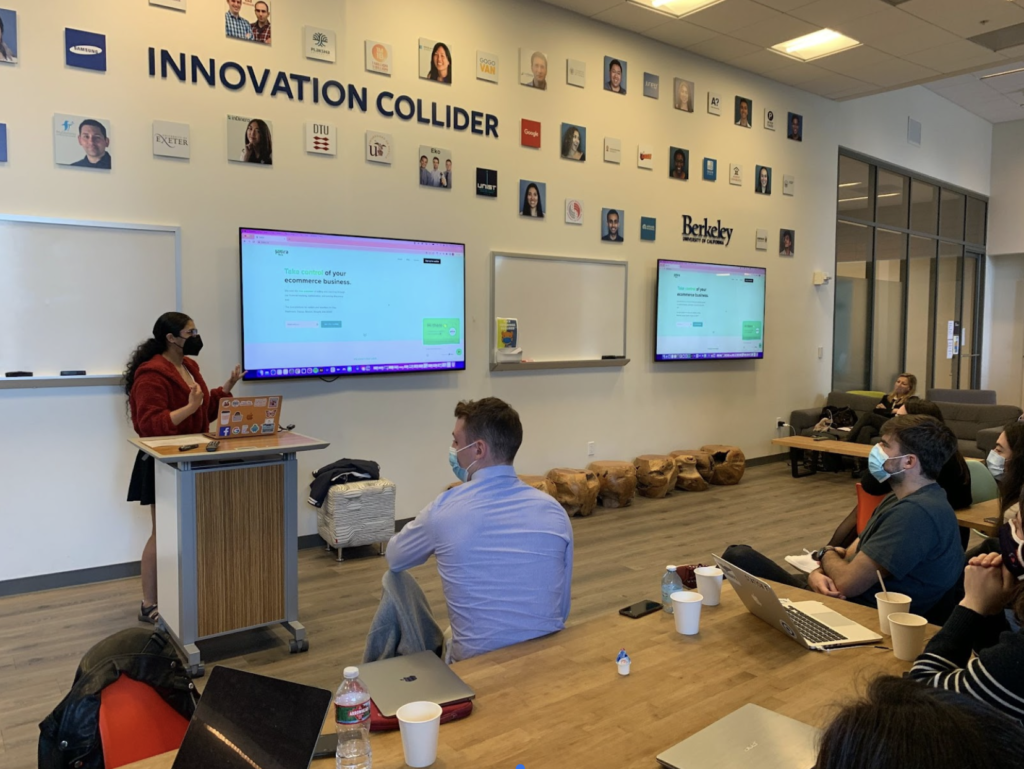Amrita Bhasin is a senior studying sociology (‘23) at UC Berkeley and also the recipient of SCET’s Certificate in Entrepreneurship in Technology. Amrita has been working hard on building and scaling her SaaS startup, Sotira, which earned 2nd place at the SCET-Silicon Alliance Pitch Contest in 2021. Since then, Amrita has finished building out Sotira’s core features and integrations competed in and won pitch competitions across the country, raised venture capital funding and opened up public beta access for Sotira to e-commerce sellers and resellers all over the world.
Being a founder of any type is one of the most challenging professions, but being a student founder at Berkeley comes with even more challenges to cross as a student entrepreneur must carefully balance between studying and working on their new venture. We wanted to learn more about Amrita’s experience as a student founder, so we followed up with her to produce the following Q&A and about her startup experience.
SCET: Tell us about Sotira. What problem(s) is it solving? What is your solution? How can students sign up to try Sotira?
Amrita Bhasin: Sotira is a customizable financial tool for ecommerce sellers and resellers on Instagram or platforms like Etsy, Poshmark, Depop, Shopify, StockX and GOAT.
Sotira enables ecommerce sellers and resellers to be more profitable with the products they sell and the platforms they sell on. Tracking financials and calculating profitability is a struggle that a lot of small business owners face, especially platform marketplace sellers and resellers. Sotira is a one stop shop for all ecommerce financials and offers integrated analytics, expense tracking, profit analysis, pricing optimization and sales forecasting.
SCET: How did you come up with the idea for Sotira?
AB: My co-founder Gary Kwong (Berkeley alumni, class of 2021) and I both struggled managing multiple income streams and online businesses. We used and tried many of the financial tools available to small business owners. I spent two years using Quickbooks and struggled to input details of sales; I found myself spending a lot of time manually creating templates and tracking expenses vs. sales.
Gary and I had built a few side projects together and had met at an entrepreneurship club called Convergent at Berkeley on campus. We had complementary skills and decided to build a software product that would help small business sellers and resellers manage the financials for their business. I handle most of the user research and testing, marketing/advertising, social media partnerships with sellers and resellers and any other product related tasks. Gary handles the technical side of building Sotira and manages our external developers. Melanie Chau (UC Davis, Class of 2023), our designer, leads product design and built our prototype, website and landing page.
Our team has traveled to compete in a lot of startup pitch competitions on and off campus. Sotira was a 2nd place winner of the AWS University Startup Competition out of 1000 companies. We won a $10,000 cash prize, and the competition is the top student startup competition in the country. Sotira was a top 14 finalist out of 460 companies at the TigerLaunch 2022 competition, and we traveled to Princeton University in New Jersey to pitch. Sotira was a top 10 finalist and prize winner at the Draper University Startup Competition. Sotira won an award at the Big Ideas Competition and received a cash prize from Binance for the LIFT Blockchain for Social Good initiative. Sotira won second place and a cash prize at the SCET Silicon Valley Alliance Fall 2021 Startup Competition and first place and a cash prize at the Entrepreneurs at Berkeley Spring 2021 Pitch Competition.

We participated in the SkyDeck HotDesk Incubator and the NSF I-Corps Customer Discovery Program.
Sotira has also been awarded cash and equity-free grants from Envision Accelerator, the NEAR Foundation, Blockchain at Berkeley, the State of California Dream Fund and 1517.
Sotira is a part of the 2022 Soma Fellowship and raised venture capital funding from Soma Capital in April 2022.
SCET: What advice would you give to new founders about getting started?
AB:

- Find a cofounder and a team with complementary skills as different perspectives and skills are crucial for building a startup and taking your product from 0-1.
- There are a lot of equity-free grants available if you do not want to raise venture capital funding. I would advise any founder to bootstrap as long as possible.
- Accelerators and fellowships are helpful for curating a founder network and meeting advisers and mentors to help you scale.
- Startup conferences can enable you to hear from successful founders and learn about strategies for building at an early stage.
SCET: Which SCET courses have you taken at Berkeley? How do you think they developed you as an entrepreneur?
AB:
I’ve taken the following classes at SCET:
Indeng 18 /ENG183C – Challenge Lab
Indeng 191/ENGIN 183E – Technology Entrepreneurship
Indeng 198 – Startup Acceleration.
Indeng 190E – Innovation X Future of Industry
Indeng 190E/Engin 183 – Deplastify the Planet (SCET article I wrote about a class project)
Indeng 95/Engin 183A – Newton Series
These classes developed me as an entrepreneur by exposing me to the journeys of so many different types of founders from traditional and nontraditional backgrounds. I was able to connect with some of the guest speakers who came to these classes, and they provided me advice and guidance on building Sotira.
SCET: Which mindsets do you think are more important for entrepreneurs? Which have helped you personally?
AB: The most important mindset is perseverance and a dedication to not giving up. Building a startup is a journey of rejection and one yes (whether it’s from a key partner, top user or investor) can literally change the course of your company. It is not uncommon for founders to get 500 no’s from investors and a single yes.
Building a company is not like what is portrayed in movies or tv shows like the Social Network or Silicon Valley. It requires a mindset of truly removing yourself from traditional structures or frameworks you may have learned in a university business class or while working at a big tech company. Ultimately, the best way to learn how to build is to just build; there is a distinction between reading articles, watching videos and taking classes about how to build vs. actually building. A lot of founders get stuck on thinking that they need to know how to build before they start a company, but I think most if not all of the learning comes from the mistakes you make along the way.
Starting a company requires a lot of courage in that you have to make sacrifices that are sometimes monetary or social. The reality of the early stages of building a company is that you are likely not paying yourself anything or you are paying yourself barely enough for rent and nothing else. Being a founder also means that your life is often very unstructured; I’ve found myself working remotely and pulling countless all nighters, living out of suitcases for months at a time, taking red eye flights in which I’ve done midterms on planes and juggling working across time zones with team members in other countries. Because you don’t have a boss or anyone telling you to get up and work, you have to be intrinsically and deeply motivated to build as a founder even if you can’t immediately see the results of your work.
Sales is the most important skill in building a company and is something that most founders have to learn and hone. You are constantly selling your company to users and customers, investors and early employees. I am lucky in that I have a lot of sales experience and I interned at Google in sales so I was able to learn from experts in one of the top sales programs. Having a strong sales background and having the courage to hop on call with or talk to anyone has helped me tremendously in building Sotira.
Thanks to Amrita for sharing her story. You can learn more about her startup, Sotira at www.sotira.co and sign up for free access at www.sotira.app.
Amrita Bhasin is a senior studying sociology (‘23) at UC Berkeley and also the recipient of SCET’s Certificate in Entrepreneurship in Technology. Amrita has been working hard on building and scaling her SaaS startup, Sotira, which earned 2nd place at the SCET-Silicon Alliance Pitch Contest in 2021. Since then, Amrita has finished building out Sotira’s core features and integrations competed in and won pitch competitions across the country, raised venture capital funding and opened up public beta access for Sotira to e-commerce sellers and resellers all over the world.
Being a founder of any type is one of the most challenging professions, but being a student founder at Berkeley comes with even more challenges to cross as a student entrepreneur must carefully balance between studying and working on their new venture. We wanted to learn more about Amrita’s experience as a student founder, so we followed up with her to produce the following Q&A and about her startup experience.
SCET: Tell us about Sotira. What problem(s) is it solving? What is your solution? How can students sign up to try Sotira?
Amrita Bhasin: Sotira is a customizable financial tool for ecommerce sellers and resellers on Instagram or platforms like Etsy, Poshmark, Depop, Shopify, StockX and GOAT.
Sotira enables ecommerce sellers and resellers to be more profitable with the products they sell and the platforms they sell on. Tracking financials and calculating profitability is a struggle that a lot of small business owners face, especially platform marketplace sellers and resellers. Sotira is a one stop shop for all ecommerce financials and offers integrated analytics, expense tracking, profit analysis, pricing optimization and sales forecasting.
SCET: How did you come up with the idea for Sotira?
AB: My co-founder Gary Kwong (Berkeley alumni, class of 2021) and I both struggled managing multiple income streams and online businesses. We used and tried many of the financial tools available to small business owners. I spent two years using Quickbooks and struggled to input details of sales; I found myself spending a lot of time manually creating templates and tracking expenses vs. sales.
Gary and I had built a few side projects together and had met at an entrepreneurship club called Convergent at Berkeley on campus. We had complementary skills and decided to build a software product that would help small business sellers and resellers manage the financials for their business. I handle most of the user research and testing, marketing/advertising, social media partnerships with sellers and resellers and any other product related tasks. Gary handles the technical side of building Sotira and manages our external developers. Melanie Chau (UC Davis, Class of 2023), our designer, leads product design and built our prototype, website and landing page.
Our team has traveled to compete in a lot of startup pitch competitions on and off campus. Sotira was a 2nd place winner of the AWS University Startup Competition out of 1000 companies. We won a $10,000 cash prize, and the competition is the top student startup competition in the country. Sotira was a top 14 finalist out of 460 companies at the TigerLaunch 2022 competition, and we traveled to Princeton University in New Jersey to pitch. Sotira was a top 10 finalist and prize winner at the Draper University Startup Competition. Sotira won an award at the Big Ideas Competition and received a cash prize from Binance for the LIFT Blockchain for Social Good initiative. Sotira won second place and a cash prize at the SCET Silicon Valley Alliance Fall 2021 Startup Competition and first place and a cash prize at the Entrepreneurs at Berkeley Spring 2021 Pitch Competition.

We participated in the SkyDeck HotDesk Incubator and the NSF I-Corps Customer Discovery Program.
Sotira has also been awarded cash and equity-free grants from Envision Accelerator, the NEAR Foundation, Blockchain at Berkeley, the State of California Dream Fund and 1517.
Sotira is a part of the 2022 Soma Fellowship and raised venture capital funding from Soma Capital in April 2022.
SCET: What advice would you give to new founders about getting started?
AB:

- Find a cofounder and a team with complementary skills as different perspectives and skills are crucial for building a startup and taking your product from 0-1.
- There are a lot of equity-free grants available if you do not want to raise venture capital funding. I would advise any founder to bootstrap as long as possible.
- Accelerators and fellowships are helpful for curating a founder network and meeting advisers and mentors to help you scale.
- Startup conferences can enable you to hear from successful founders and learn about strategies for building at an early stage.
SCET: Which SCET courses have you taken at Berkeley? How do you think they developed you as an entrepreneur?
AB:
I’ve taken the following classes at SCET:
Indeng 18 /ENG183C – Challenge Lab
Indeng 191/ENGIN 183E – Technology Entrepreneurship
Indeng 198 – Startup Acceleration.
Indeng 190E – Innovation X Future of Industry
Indeng 190E/Engin 183 – Deplastify the Planet (SCET article I wrote about a class project)
Indeng 95/Engin 183A – Newton Series
These classes developed me as an entrepreneur by exposing me to the journeys of so many different types of founders from traditional and nontraditional backgrounds. I was able to connect with some of the guest speakers who came to these classes, and they provided me advice and guidance on building Sotira.
SCET: Which mindsets do you think are more important for entrepreneurs? Which have helped you personally?
AB: The most important mindset is perseverance and a dedication to not giving up. Building a startup is a journey of rejection and one yes (whether it’s from a key partner, top user or investor) can literally change the course of your company. It is not uncommon for founders to get 500 no’s from investors and a single yes.
Building a company is not like what is portrayed in movies or tv shows like the Social Network or Silicon Valley. It requires a mindset of truly removing yourself from traditional structures or frameworks you may have learned in a university business class or while working at a big tech company. Ultimately, the best way to learn how to build is to just build; there is a distinction between reading articles, watching videos and taking classes about how to build vs. actually building. A lot of founders get stuck on thinking that they need to know how to build before they start a company, but I think most if not all of the learning comes from the mistakes you make along the way.
Starting a company requires a lot of courage in that you have to make sacrifices that are sometimes monetary or social. The reality of the early stages of building a company is that you are likely not paying yourself anything or you are paying yourself barely enough for rent and nothing else. Being a founder also means that your life is often very unstructured; I’ve found myself working remotely and pulling countless all nighters, living out of suitcases for months at a time, taking red eye flights in which I’ve done midterms on planes and juggling working across time zones with team members in other countries. Because you don’t have a boss or anyone telling you to get up and work, you have to be intrinsically and deeply motivated to build as a founder even if you can’t immediately see the results of your work.
Sales is the most important skill in building a company and is something that most founders have to learn and hone. You are constantly selling your company to users and customers, investors and early employees. I am lucky in that I have a lot of sales experience and I interned at Google in sales so I was able to learn from experts in one of the top sales programs. Having a strong sales background and having the courage to hop on call with or talk to anyone has helped me tremendously in building Sotira.
Thanks to Amrita for sharing her story. You can learn more about her startup, Sotira at www.sotira.co and sign up for free access at www.sotira.app.


